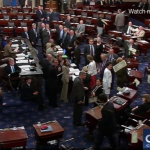“Out of common courtesy, I will be
sending him a fruit basket welcoming
him to the district.”
by Rep. Candice Miller, jabbing his newly announced opponent, Paul Mitchell,
Alan Sanborn’s tongue-in-cheek quote (above), essentially
calling Paul Mitchell a carpetbagger based on Mitchell’s declaration to run for
office in the 10th District, was selected by the MIRS
news service as its “quote of the day” on Monday.
Expect Mitchell, leader of the successful campaign to defeat
the Proposal 1 road tax plan, to face a lot of questions and criticism about
changing his residency – yet again – and pursuing an eighth political job in
less than three years.
and later owner of Ross Medical Education Center, Mitchell moved his residency from
Saginaw to a farm in Dryden Township, Lapeer County, in order to run in the 10th
District, which stretches from Sterling Heights, through northern Macomb County
and to the tip of the Thumb Area. It appears that he moved just before the
announcement of his congressional candidacy.
Sanborn, a former state senator from north Macomb’s Richmond
Township, state Sen. Phil Pavlov of St. Clair and Shelby Township Treasurer
Mike Flynn, also of north Macomb, are the other contenders for the GOP
nomination in the solidly Republican district.
A bit of a spotty reputation dogs Mitchell in some GOP
circles because he has drifted from one political post to the next, lasting
only a few months in most of those endeavors.
Mitchell was elected to the St. Clair City Council; resigned a few months later
after a spat with his council colleagues, which caused him to bemoan the
political process.
announced plans to run for an open state Senate seat in 2014; quit the race a
few months later, more than a year before the election.
Summer 2013 – Changed his residency to his
northern Michigan summer home, reportedly with plans to run for a different open
state Senate seat; changed his mind and restored his Saginaw Township
residency.
self-funded a new federal super-PAC, Pure PAC, that was created to defeat Gary
Peters in last year’s U.S. Senate campaign; Pure PAC’s operations faded away
long before Peters won the November 2014 election.
chairman of the Michigan Republican Party; quit several weeks later to pursue
an open congressional seat.
mid-Michigan’s 4th District seat after incumbent Rep. Dave Camp decided not to
seek re-election.
went on to win Camp’s seat in November; faced campaign criticism as a
carpetbagger and for spending $3.5 million of his own money on the race.
Coalition, replacing the outgoing Glenn Clark, a longtime Religious Right
advocate.
lead group that fought Prop. 1.
election, declared his candidacy for the open seat in the 10th District created
by Congresswoman Miller’s decision to retire.
“Off The Record,” the panel peppered Mitchell with questions about his “whirlwind”
entrance into politics and what his plans were next after the May 5 special
election on the road funding proposal. Mitchell insisted that he had no “end game,”
that he was not a political animal, and he was not seeking to use the Prop. 1 campaign
as a jumping-off point for another political run.
failed to succeed you’re — the
rumor mill is — you’re … instantaneously running for every other
office that exists.”
rumor mill can barely keep up.








As someone who volunteered with the anti-prop one group I know that Mr. Mitchell did not resign Faith and Freedom to lead that charge. He stayed in both roles. Just an fyi.
Paul Mitchell had no business being in any part of the Faith and Freedom Coalition: if Mitchel is the kind of individual they want to be in any leadership position, I will never donate one penny of the resources that the Lord provides for me to them, if they believe that Rep. Mitchell is a true believer! His voting record as my representative in the 10th Congressional District has been dismal! He’s proven to be a RINO with absolutely no courage, and a typical politically correct coward with no backbone when it comes to Standing Up for Biblical principles and Truth: he’s been absolutely silent and absent on the Truth of Holy Scripture!